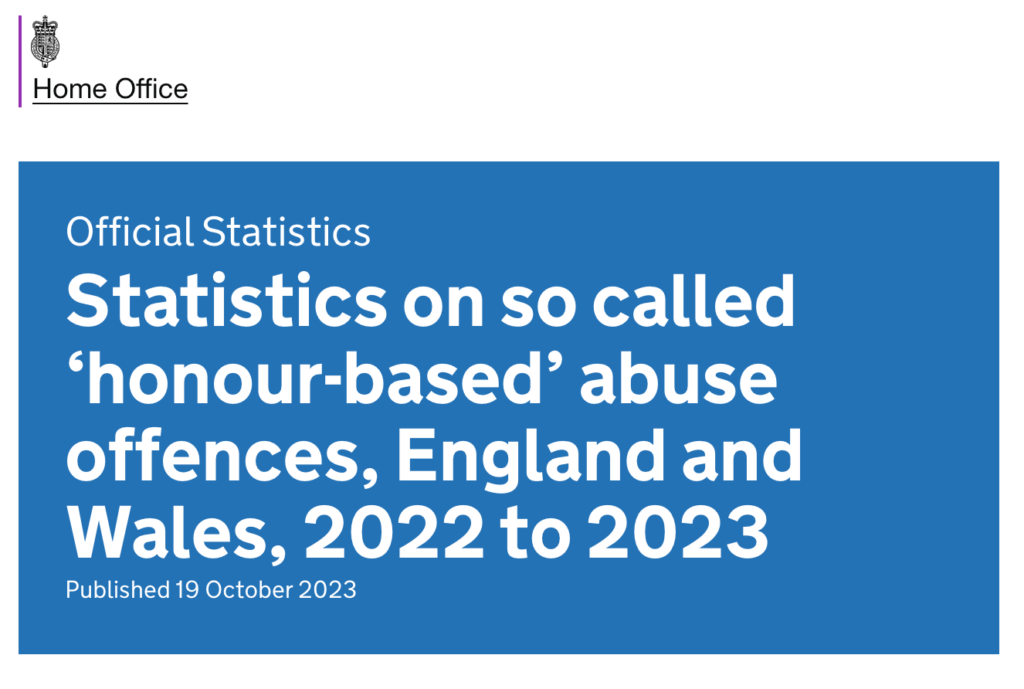Home Office data released today (19th October) on ‘honour’-based abuse (HBA) offences in England and Wales for 2022 – 2023 has revealed another increase in HBA-related offences.
The publication of the annual data marks a third consecutive year where there has been a rise in HBA-related offences and incidents.
In the year ending March 2023, there were 2,905 HBA-related offences recorded by the police in England and Wales (excluding Devon and Cornwall), an increase of 1% compared with the year ending March 2022 (2,871 offences). Of the 2,905 HBA offences, 84 were FGM offences and 172 were forced marriage offences.
The data also shows that there were 2,018 HBA-related incidents recorded by the police, an increase of 10% compared with the previous year (up 151 from 1,830). These cover incidents reported to the police that, following investigation, do not amount to an offence according to the National Crime Recording Standard.
In the same reporting period, Savera UK has seen an increase of almost 6% in new referrals into its service, with demand continuing to grow.
Savera UK CEO and Founder, Afrah Qassim, said: “Last year to 31st March 2023 we had 148 new referrals. This year to date we have already received 108, which is a clear increase on our position this time last year.
“Although smaller than increases seen in previous years, the rise in HBA-related offences according to the national data, is still extremely concerning. Firstly and most importantly, any increase in offences that constitute an abuse of human rights is unacceptable.
“Secondly, we know that the figures still do not show the whole picture due to these crimes being hidden, not recognised or not properly recorded. Working at a grassroots level, on the frontline and directly with communities, we are experiencing a significant and growing increase in demand for our services.”
“The 10% increase in HBA-related incidents that do not amount to an offence is also extremely concerning. HBA is a multi-faceted and cumulative issue and incidents that do not amount to a criminal offence are often an early indicator. In cases of HBA there is often only one chance to prevent someone from harm or abuse and these incidents may amount to that one chance, if they are not handled appropriately those chances could be missed and lives lost.”
The latest national data also revealed that the highest proportion (19%) of HBA-related offences were for controlling and coercive behaviour. This data supports Savera UK and the University of Liverpool’s research into the characteristics of HBA, which identified emotional/psychological abuse and coercive and controlling behaviour as the most common characteristic in cases of HBA and harmful practice.
Afrah continued: “The true prevalence of HBA and harmful practices in the UK are unknown due to the limited data recorded, which makes it very difficult to understand the scale of the problem. It is vital that we continue to work with communities, professionals and partners to raise awareness of these practices, better understand their causes through research and develop more effective, robust and appropriate reporting methods and responses, so we provide survivors and those at risk with the help that they need and deserve.
“The government also needs to make a commitment, in terms of focus and funding, to ending HBA and harmful practices. There is still no central database that specialist organisations leading on HBA and harmful practices can contribute to, and more work also needs to be done to develop specialist HBA risk assessment tools and improve prevention strategies. Savera UK will continue to call for the government to step up and address these areas so we can work to fulfil our mission.”








